In the modern history of the Seleção, Portugal have suffered for decades trying to find a prolific goalscorer (with the obvious exception of Cristiano Ronaldo, featured in Portugal’s all-time ten greatest wingers article), but if you think that in the past the nation has not produced many, think again.
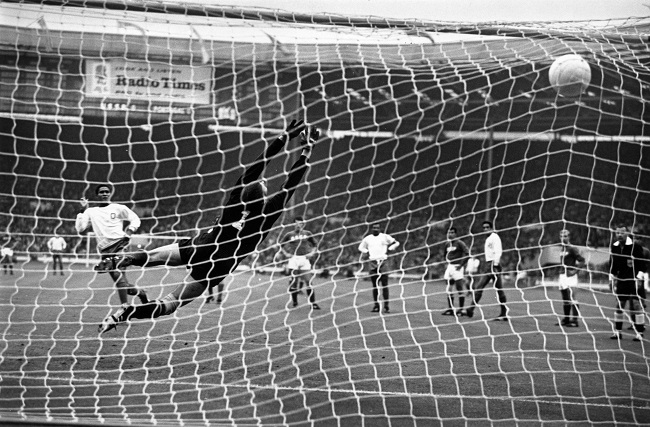
Portugal is home to some of the best and most prolific forwards of all time, including several record breakers and names that would shatter the dreams and expectations of defenders and goalkeepers across football history. Heroes hailing from Africa, Madeira, the Azores and continental Portugal have shown how deadly they can be in front of goal for almost a century now.
***
Fernando Peyroteo (20 caps)
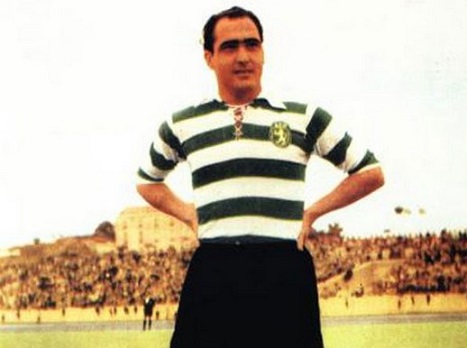 There is no forward in the history of football with a goalscoring record that can match Fernando Peyroteo. That doesn’t just make him one of the greatest Portuguese forwards of all time. He is one of the greatest ever, period. How could he not be? Peyroteo played 323 official matches for Sporting and scored 556 goals. Practically two goals for each match during twelve years, where he absolutely dominated the domestic game.
There is no forward in the history of football with a goalscoring record that can match Fernando Peyroteo. That doesn’t just make him one of the greatest Portuguese forwards of all time. He is one of the greatest ever, period. How could he not be? Peyroteo played 323 official matches for Sporting and scored 556 goals. Practically two goals for each match during twelve years, where he absolutely dominated the domestic game.
He had the bad luck of playing for Portugal at the lowest point of the national side’s history – even if in 20 matches he netted 15 goals. Likewise, when he played regional or continental European competitions had not yet been set up where he could showcase his phenomenal talents. He retired in 1949, just when the Latin Cup was starting and he played in its first edition, guiding Sporting to the final, which they lost against FC Barcelona.
Born in Angola, the first Portuguese African superstar, he moved to Lisbon aged 19 to play for Sporting after making a name for himself at local clubs in his homeland. With the Lions, he won five league trophies and four Portuguese Cups, finishing as top scorer on six occasions. He remains today the greatest goalscorer in the league with 336 goals to his name, including 9 in a league win against Leça, still an unbroken record. He famously scored four past Benfica in a title decider in 1948 despite playing with a fever, and Peyroteo netted a total of 67 goals in 49 matches against Sporting’s biggest rivals.
Without much TV footage available, radio and newspaper clips are all we have left from his brilliant career, but the numbers don’t lie. Eusébio might have been the greatest forward ever to play for the Portuguese national team, but Peyroteo is likely the deadliest striker in the history of the national game.
 |
Fernando Gomes (48 caps)
They called him Bibota for a reason. Two Golden Boots to his name. Fernando Gomes was the only Portuguese footballer besides Eusébio and Cristiano Ronaldo to win the trophy as the best goalscorer in European leagues and his career is full of iconic moments. A Porto youth graduate, probably the best in its history, Gomes was the greatest national striker in the period between Eusébio and Ronaldo.

He scored 288 goals in 342 official matches played for the Dragons in two different periods, including one in the Intercontinental final played during a snowstorm in Tokyo. A decade before, he had helped the club of his life to win their first league title in 19 years, the first of five. In 1983 and 1985, Gomes finished as Europe’s best goalscorer, and he was Portugal’s top scorer on six different occasions, equalling Peyroteo’s record. Gomes had great technique on the ball and would often drift from position, but was also deadly in the box.
When coach Pedroto and president Pinto da Costa were forced out of the club, he requested a transfer and signed for Sporting Gijón, where he played for two seasons but never made an impact due to long-term injury. Re-signed by Porto in 1982/83, Gomes was appointed club captain by Pedroto and guided the side to the Cup Winners’ Cup final in 1984 and the European Cup final of 1987. An injury, days before the match, prevented him from playing in Vienna as Porto became champions of Europe for the first time.
Two years later, a row with coach Artur Jorge forced him once again to leave Porto, and this time he opted to stay in Portugal and sign for Sporting, where he scored 31 goals in two seasons. Portugal’s main striker at Euro 84 and World Cup 86, he didn’t have the same goalscoring impact with the national side but remained a much-respected figure nonetheless.
José Águas (25 caps)
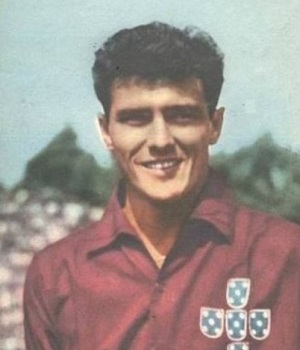 The Golden Head was his nickname, one of the best headers in the history of the game, and the only Portuguese club captain ever to lift the European Cup twice. José Águas was Benfica’s main goalscoring threat during the 1950s, a time when he ruled in the Portuguese league, thus succeeding Peyroteo. In a way, it represented the shift of power from Sporting to Benfica, although his most memorable moments came at the end of his career when, under Belá Guttman, he captained the Eagles to back-to-back European Cup wins, something Portuguese football never again had the pleasure to enjoy.
The Golden Head was his nickname, one of the best headers in the history of the game, and the only Portuguese club captain ever to lift the European Cup twice. José Águas was Benfica’s main goalscoring threat during the 1950s, a time when he ruled in the Portuguese league, thus succeeding Peyroteo. In a way, it represented the shift of power from Sporting to Benfica, although his most memorable moments came at the end of his career when, under Belá Guttman, he captained the Eagles to back-to-back European Cup wins, something Portuguese football never again had the pleasure to enjoy.
His numbers with the national side, like with many strikers of his day, pales in comparison to what he did with the club that signed him during a tour in Africa and brought him to Lisbon to become the very essence of what a Benfica club captain should be all about. During the fifties, he won five top scorer awards in the Portuguese league and in 1961 he was top goalscorer in the European Cup as well. With seven Portuguese Cups and five league titles won, he was the first idol of the crowd at the newly inaugurated Estádio da Luz.
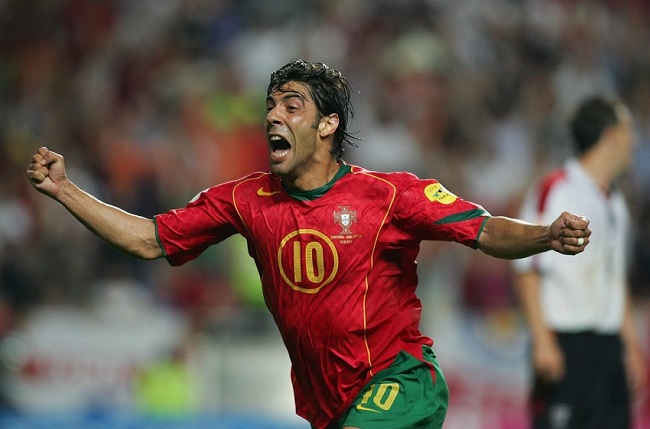 |
Artur de Sousa, Pinga (21 caps)
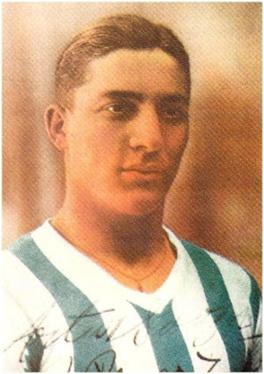 Before Cristiano Ronaldo, the island of Madeira had already gifted Portuguese football with a remarkable goalscorer. Artur de Sousa was known as Pinga because he was so fast to dispatch opponents that he seemed he could pass through them like raindrops (pingas in Portuguese). Born in Funchal in 1909, he quickly became a local celebrity and debuted for Marítimo at the age of 20.
Before Cristiano Ronaldo, the island of Madeira had already gifted Portuguese football with a remarkable goalscorer. Artur de Sousa was known as Pinga because he was so fast to dispatch opponents that he seemed he could pass through them like raindrops (pingas in Portuguese). Born in Funchal in 1909, he quickly became a local celebrity and debuted for Marítimo at the age of 20.
Porto quickly signed him after watching him tear the Dragons’ defence apart during a clash between both sides. He moved to the north of Portugal, where he became the first club legend. His partnership with Waldemar Mota became the stuff of legends, and the press called them the Noon Devils because of the usual kick-off time for matches then. He won two Campeonato de Portugal titles for the Blue and Whites, and at the end of the 1930s, when the football league was officially formed, he added two more back-to-back trophies, besides the first experimental league win in 1934. During his career, Pinga had several offers from international clubs, particularly from Brazil and Spain, but never left the club and city that had adopted him.
He has been ranked as scoring almost 400 goals in as many matches, although many weren’t official games. He often was the only Porto player called up to the national side during the thirties, and his most famous performance was a hat-trick against Ricardo Zamora, the Spanish goalkeeper, during a 3-3 draw in 1935 that had the likes of Real Madrid and Barcelona approaching him after the game, to no avail. He embraced a short-lived coaching career at the end of his life and died prematurely, aged only 54.
João Vieira Pinto (81 caps)
The Golden Boy of the Golden Generation. João Vieira Pinto was more of an attacking midfielder at heart than a striker, but he could also score brilliant and often decisive goals. The fact that, contrary to the likes of Rui Costa, Luís Figo or Paulo Sousa, he never travelled abroad to play may have diminished his popularity outside of Portugal, but few players have been so dominant in the domestic competition over the most recent decades. In fact, he did move abroad when he was only 18, to Atlético Madrid, and was touted to be Paulo Futre’s successor at the club, but he felt homesick and was tired of being forced to play in the Colchoneros reserves after having already made such an impact with the Boavista shirt, the club he graduated from after Porto had turn him down years earlier. In 1991, he returned to Bessa and became the most coveted player in the league, eventually signing for Benfica the following summer.
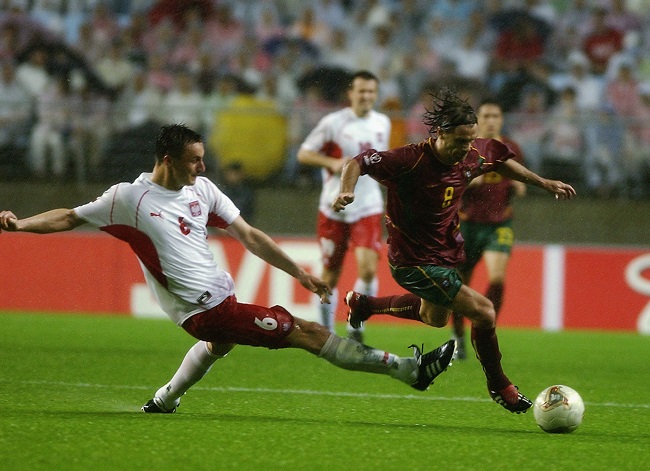
Pinto spent eight years with the Eagles and lived the best and worst of times. A key element in the 1993/94 title winning season, scoring a memorable hat-trick in one of the most famous Lisbon derbies in history, he was also the club captain during the first period of the so-called Vietnam years. A period that ended with Benfica releasing him 2000 days before the European Championship was to kick off. JVP, who had been Carlos Queiroz’s most beloved player in the 1989 and 1991 under-20 World Cup winning squads, had already played for Portugal at Euro 96 but four years later was a key player as the side reached the semi-finals, scoring a brilliant header against England in a classic opening match that ended in a memorable 3-2 victory for the Seleção.
After the tournament, he signed for Sporting, a move that rocked the foundations of Portuguese football. With the Lions, he won his second league title in 2002, partnering Mário Jardel in the attack, and then later returned to Boavista before a short final spell at Braga. A forward with an attitude, he famously got involved with Paulinho Santos in several infamous episodes and, most famously, punched the referee in the defeat against South Korea in the 2002 World Cup that ended his international career and Portugal’s hopes of progressing to the last sixteen.
Rui Jordão (43 caps)
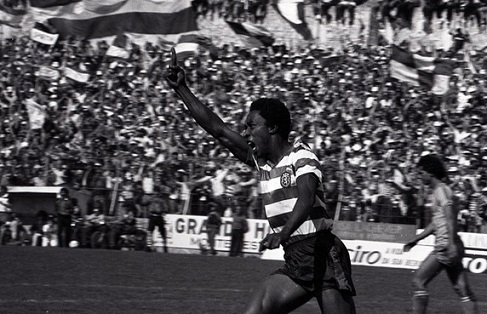 When Jordão decided to end his career, he immediately started a new one as a painter. It might have looked like an odd choice, but then again, he already drew goals of wonder during his playing days. Jordão was a special striker. Not the tallest nor the fastest, never a killer in the box, but he still managed to be in the right place at every given moment. Although he only scored 15 goals for Portugal – in 43 caps, which seems odd for a striker – everyone remembers the two he netted against France in the Euro 84 semi-finals.
When Jordão decided to end his career, he immediately started a new one as a painter. It might have looked like an odd choice, but then again, he already drew goals of wonder during his playing days. Jordão was a special striker. Not the tallest nor the fastest, never a killer in the box, but he still managed to be in the right place at every given moment. Although he only scored 15 goals for Portugal – in 43 caps, which seems odd for a striker – everyone remembers the two he netted against France in the Euro 84 semi-finals.
By then, he was already 32 and had spent the best part of the previous decade playing in the shadow of other, more popular forwards. He was signed in 1971 for Benfica from Sporting Benguela in Angola, aged only 19, with the Eagles hoping he would succeed Eusébio in the front line. For the following years, Jordão played alongside him and also Artur Jorge, who regularly outscored him, and proved his worth, but never managed to be the league’s top scorer and some Benfica supporters believed he didn’t have it in him to be a top-class striker.
In 1976, he was sold to Real Zaragoza and played a season in La Liga, scoring 14 goals in 33 league appearances, numbers that persuaded Sporting to sign him back to join Manuel Fernandes in a striking partnership for the future. The two learned to work together brilliantly, making Jordão twice the league’s top scorer, netting 150 goals in 200 matches played for the Lions until a row with John Toshack ended his stint at Alvalade. The argument cost him a place in the 1986 World Cup, but to prove everyone wrong, Jordão signed for Setúbal, where he kept on scoring for two more seasons before hanging up his boots in a high. He had also played that season his final match for Portugal, having debuted in 1971, a brilliant eighteen-year span.
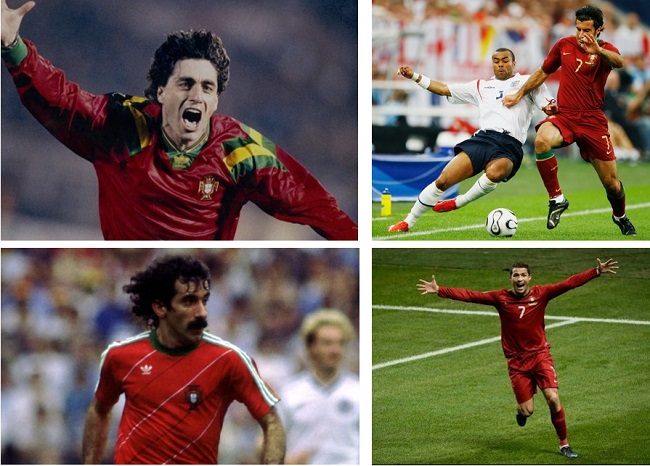 |
Pauleta (88 caps)
For someone who held the record of most goals scored for the national side it’s hard to believe that Pauleta never played a single match in Portugal’s top league. His career is proof that sometimes appearances can be deceiving and that football from the 1990s onwards opened doors that in the decades before would have probably been closed to someone who was born in the distant Azores.
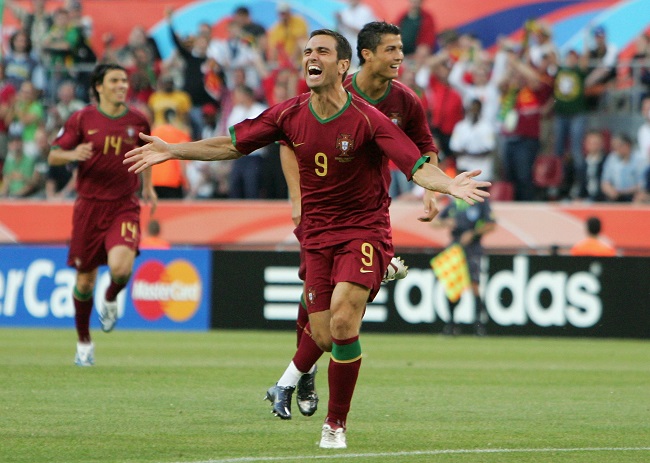
Despite impressing as a teenager, Pauleta soon realised that Santa Clara, still a minnow in those years, wouldn’t be able to offer him the career he wanted, so, still a teenager, he moved to the Estoril youth academy. He was quickly promoted to the first side, which played in the second tier, and from there on he joined the Portuguese legion that flocked to Salamanca when the side was promoted to La Liga in 1996. He made a name for himself in Spanish football, first by scoring more than thirty goals in two years for the Salmantinos, and then as part of the Deportivo side that won the league in 2000.
The following summer, after having played in the Euro 2000 finals for Portugal – the first player to do so without having played in the Primeira Liga – he moved to France, where he became a local legend, first with Girondins Bordeaux and then with PSG. In France, he scored 141 goals in eight seasons, finishing top-scorer on three occasions. Sadly, the Olympique Lyon domination period meant he was never a league champion. In 2002, he scored a hat-trick against Poland in the World Cup, and for the following decade, he kept on scoring freely, surpassing Eusébio as the nation’s top goalscorer in 2006, with 47 goals in 88 matches, a record since only surpassed by Cristiano Ronaldo, who played alongside him in the final years of his international career.
Eusébio (64 caps)
Eusébio da Silva Ferreira is not just Portugal’s best ever striker. He is one of the greatest names in the history of the game. Rivalling the likes of Pelé or Bobby Charlton in his playing days, Eusébio is probably a firm candidate for a place in the top 20 list of football icons. He was undoubtedly the best European player in the 1960s and remains today the greatest footballer ever to be born in Africa. His performance during the 1966 World Cup ranks among the ones that the likes of Garrincha, Maradona and Messi enjoyed, a tournament where he ended as top goal-scorer, netting four past North Korea in a memorable comeback win.

By then, he had guided Benfica to their second European Cup win, a competition he would never again win, despite playing in three more finals. During the 1960s and early 1970s, few players in the world scored as many goals as he did. He netted 317 for Benfica in 301 matches, and 41 for Portugal in 64 caps, a record that stood until 2006. He still has the record for most top goalscorer trophies in the domestic league – seven times he topped the charts – as he helped Benfica become champions of Portugal 11 times, also a record. Only Di Stefano scored more goals than Eusébio during the European Cup years, between 1955 and 1992, a staggering feat.
Eusébio was probably the most complete footballer in the history of the Portuguese game. He was fast, strong, had a lethal shot, was brilliant at set pieces and a terrific header of the ball. He endured five knee operations, leaving everyone wondering what his career would have been like if he had stayed healthy for a few more seasons than he actually did. Whenever people thought of Portuguese football until the Cristiano Ronaldo global phenomenon, they thought of Eusébio and with good reason. No player was as beloved and respected – even by opponents – as he was, despite his arrival in Portugal adding an extra spicy touch to the Benfica-Sporting rivalry. While Peyroteo was the standard bearer of Sporting’s domestic dominance, Eusébio led the changing of the guard and made Benfica not only the biggest club in Portugal but also one of the biggest in the world. A legacy that survives the man everyone at the Estádio da Luz called The King.
Manuel Fernandes (31 caps)
Manuel Fernandes is remembered as Mr Sporting and with good reason. The prolific striker played for the Lions for more than a decade and scored almost 200 goals in the club’s shirt. Ironically, he was top scorer only once, in 1986, including a four-goal haul past Benfica in a famous 7-1 win, and at the end of the season he was still left out of the national side to play in the Mexico World Cup.
![]()
Born in Sarilhos Pequenos, a village near Seixal, Fernandes began his playing days at CUF, working for the Fabril company and scoring for fun in what was essentially the first club-company in Portuguese football. The April 1974 revolution meant the end of professional football at CUF and in 1975 he moved to Sporting, where he quickly settled in as a crowd favourite. Alongside Jordão, subsequently signed from Zaragoza, he struck a remarkable partnership that lasted for a decade and brought the club two league titles and two Portuguese Cup wins. When António Oliveira signed for Sporting in 1981/82, the trio completely dominated the league as few had done in the past, even if it was short-lived. Fernandes remains the club’s second-best goalscorer, only behind Peyroteo, but in 1987, he was forced out and moved to Setúbal, where he played for one more season, scoring 16 goals along the way.
His career with the national side was shorter and never fully matched up to the standards he set at club level. He also had an interesting career as a manager and hired in his early days a young José Mourinho as assistant when he was coaching Ovarense and Estrela da Amadora, later taking him with him once he joined Bobby Robson’s staff at Sporting in 1992. The rest, as they say, is history.
Matateu (27 caps)
Matateu was the first black star of Portuguese football. Until he came along, all the African players brought to the continent were white, sons of native Portuguese who had moved to Africa for a better life. He set a different trend, paving the way for the likes of Mário Coluna and Eusébio, and proved that black-skinned footballers could be as good as or better than anyone else. The way he was celebrated by the Restelo crowds was, somehow, unthinkable during a fascist regime that tried its best to sell the idea that Africans were as Portuguese as those from the metropolis, but which was still profoundly racist at heart. Matateu broke all sorts of barriers during that period, and he was never one who liked to shut up, having even been arrested during a match after confronting a referee, before finally being released with no charges.
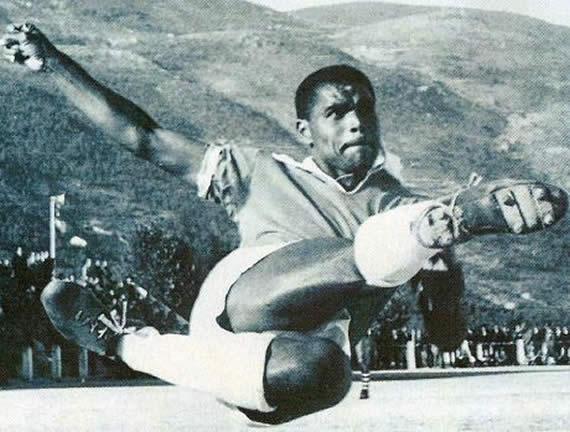
Born in Lourenço Marques, like Eusébio, only fifteen years earlier in 1927, he began his career playing for local sides until a Belenenses scout spotted him and took him to the Salésias ground in 1951. During the 1950s, he was one of the greatest footballers of the domestic league, rivalling José Águas from Benfica, Hernâni from Porto and Travassos from Sporting. Matateu was twice the top goal-scorer in the league. He took Belenenses to two second-place finishes that could have been league wins if it weren’t for last day dramatics. He remains the best Portuguese player never to win the competition. His only trophy was a Cup win in 1960. He then moved to Canada, where he ended his days. With Portugal, he played almost thirty official matches but peaked too soon and was never called up to play alongside a teenage Eusébio in his final years at Belenenses.
By Miguel Lourenço Pereira, author of “Bring Me That Horizon – A Journey to the Soul of Portuguese Football”.

